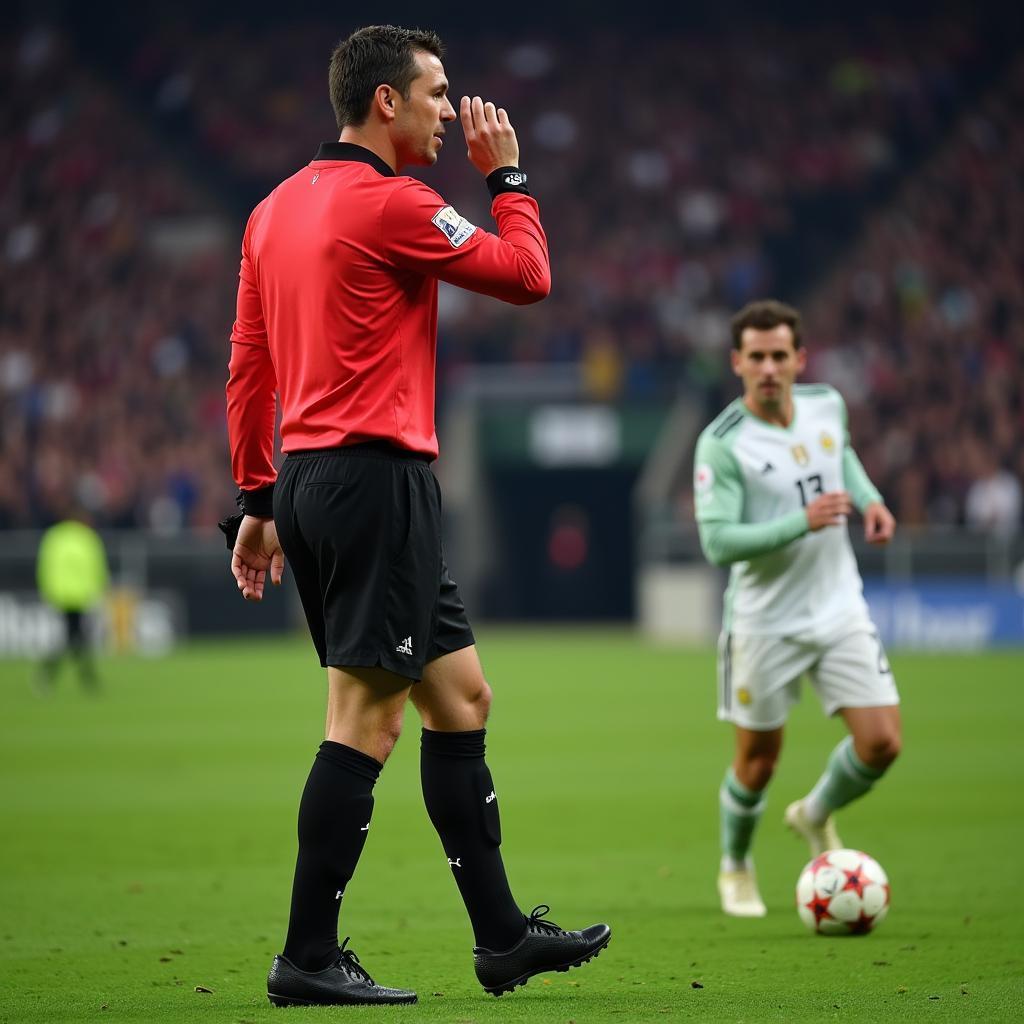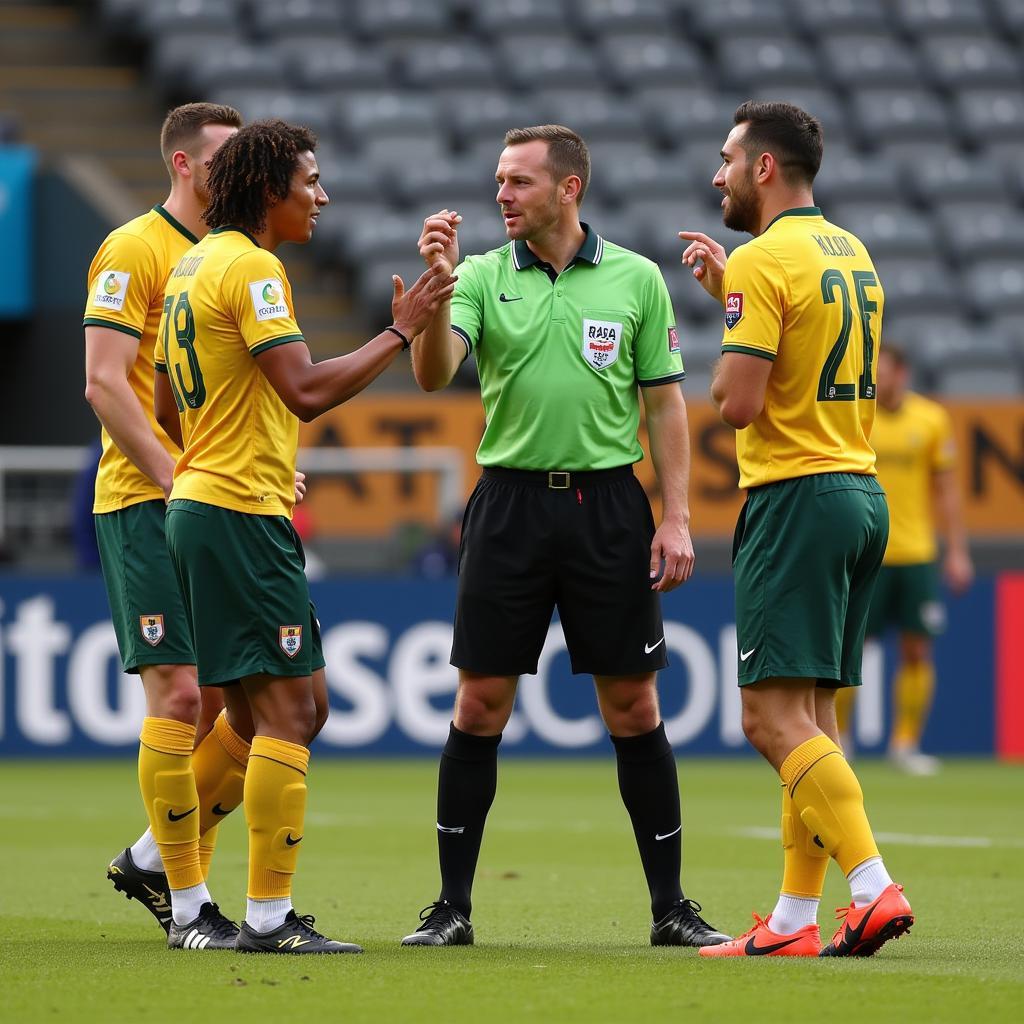Referees Blowing the Whistle When Players Don’t Return the Ball: Fair Play or Unnecessary Interruption?
October 10, 2024The beautiful game is filled with unwritten rules, moments of sportsmanship, and, of course, controversy. One such point of contention that often sparks debate among players and fans alike is the referee’s decision to blow the whistle when a player doesn’t return the ball to the opposition after a stoppage in play. While the gesture of returning the ball is generally considered good sportsmanship, is it always necessary for the referee to intervene?
 Referee Blowing Whistle as Player Holds Onto Ball
Referee Blowing Whistle as Player Holds Onto Ball
The Spirit of the Game vs. The Rulebook
The act of returning the ball after a stoppage, often due to an injury or the ball going out of play, is rooted in the spirit of fair play. It’s an unspoken agreement that transcends the official rules, acknowledging that both teams are there to compete and unnecessary delays only hinder the flow of the match. When a player disregards this unwritten rule, it can be perceived as unsportsmanlike conduct, potentially leading to frustration and even retaliation from the opposing team.
However, the official rulebook doesn’t explicitly mandate returning the ball in every situation. This is where the referee’s judgement comes into play. Experienced referees often possess an innate ability to read the game and understand the context of the situation. They consider factors such as the intent behind not returning the ball, the time remaining in the match, and the overall temperament of the players involved.
 Players Arguing With Referee After Whistle Blown
Players Arguing With Referee After Whistle Blown
When Intervention is Justified
There are instances where the referee’s intervention is deemed necessary to ensure fairness and prevent unsportsmanlike behavior:
- Obvious Time-Wasting: If a team is clearly trying to run down the clock by refusing to return the ball, the referee is well within their right to blow the whistle and restart play.
- Potential for Escalation: When the act of not returning the ball leads to confrontations and aggressive behavior between players, the referee might intervene to maintain order and prevent the situation from escalating.
- Unsporting Advantage: If a player gains an unfair advantage by not returning the ball, such as launching a quick attack while the opposition expects a fair restart, the referee might intervene to nullify the advantage.
The Case for Letting the Game Flow
On the other hand, there are arguments against excessive referee intervention in these situations:
- Disrupting Momentum: Frequently blowing the whistle for minor infractions like not returning the ball can disrupt the natural rhythm and flow of the game.
- Undermining Player Agency: Constantly intervening can be perceived as referees “babysitting” professional players who should be capable of managing these situations themselves.
- Opening the Door to Interpretation: Without clear-cut rules, the decision to blow the whistle becomes subjective, potentially leading to inconsistent officiating and accusations of bias.
Finding the Right Balance
The key to effectively managing these situations lies in finding the right balance between upholding the spirit of the game and allowing the game to flow naturally. Referees need to utilize their experience, judgement, and communication skills to make decisions that are fair, consistent, and conducive to an enjoyable and competitive match for both players and spectators alike.
 Football Match in Progress With Focus on Ball
Football Match in Progress With Focus on Ball
FAQs
1. Is there a specific rule about returning the ball in football?
While there’s no specific rule that mandates returning the ball after every stoppage, fair play principles encourage this gesture. Referees have the authority to manage situations where this unwritten rule is disregarded.
2. Can a player be penalized for not returning the ball?
Technically, there’s no direct penalty for not returning the ball. However, referees can issue yellow cards for unsportsmanlike conduct or time-wasting, which could be indirectly related to a refusal to return the ball.
3. How can players avoid controversies related to returning the ball?
Open communication between players and clear signals from the referee regarding the restart of play can help minimize misunderstandings and potential conflicts.
4. Are there any differences in how this unwritten rule is applied at different levels of football?
While the spirit of the rule remains the same, professional matches might see a slightly more lenient approach compared to youth or amateur games, where stricter adherence to fair play principles is often emphasized.
5. What role does the crowd play in these situations?
Crowd reactions can sometimes influence the referee’s decision-making. Loud cheers or jeers from the stands can add pressure or create a more emotionally charged atmosphere, potentially impacting how referees manage these unwritten rules.
Need More Information?
Have more questions about the rules of the game or other aspects of football? We’re here to help! Contact us at:
Phone: 0396443476
Email: [email protected]
Address: 23 Tháng 3, Đắk Nia, Gia Nghĩa, Đắk Nông, Việt Nam
Our dedicated customer support team is available 24/7 to assist you.